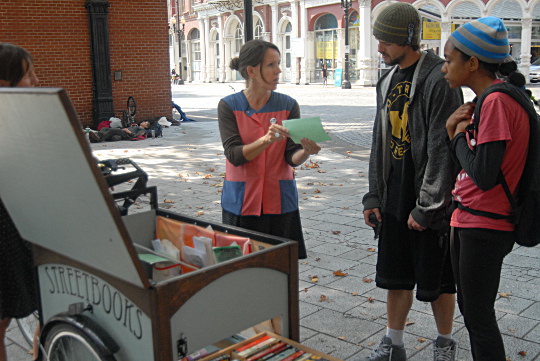
After four summers loaded with all the paperbacks you can fit on a cargo trike, Portland’s most public library is rolling merrily forward.
Street Books, created in 2011 by Laura Moulton as a one-time art project, wasn’t conceived as a continuing service. But its immediate popularity among Portlanders who live outside made Moulton realize it was an idea with wheels.
“This year everybody has been reading Gabriel Garcia Marquez, I think because he just died,” said Diana Rempe, one of Moulton’s two part-time co-librarians, in an interview last week. “I just cannot keep him in there.”
Last week Street Books celebrated its fourth summer of operation at a fundraiser and party, where it released the video above.
“I’ve been coming here for over three years,” said a young man who gave his name only as Jonathan, after chatting with Rempe and Moulton about the science fiction writer Philip K. Dick near Skidmore Fountain last Tuesday.
“His self-proclaimed masterpiece is A Scanner Darkly,” Jonathan told Rempe. “It’s a lot more nuanced than the film version.”
Thanks to its mobility, the Street Books trike visits a rotating series of sites three days a week during the summer: Old Town’s Right to Dream Too settlement, Skidmore Fountain and waterfront on Tuesdays; the central eastside’s Martin Luther King worker center and St. Francis Parish on Wednesdays; and Sisters of the Road, Bud Clark Commons and the North Park Blocks in the south Pearl on Thursdays.
It wouldn’t work in a motor vehicle, Rempe said.
“I couldn’t go to the places where people are,” she said. “I can’t ride that bike a block without people waving, saying hello, yelling ‘Library lady!'”
Advertisement
Street Books has its own set of library cards and a simple check-out card tucked into the front cover of each book, like most libraries before the digital age:

The books are mostly donated, though the team sometimes visits Goodwill or other used-book sites to look for material, especially if it’s written in Spanish.
“We really need Spanish-langauge books,” Rempe said.

Moulton said the idea came out of a conversation about books with a man she knew as “Quiet Joe.”
“We had an author in common that we liked,” she said. “I hadn’t thought about the fact that he might be more well-read than I am.”
That truth — that many people who live outside cherish books and reading but are rarely able to keep libraries of their own — is the heart of the Street Books mission, said Rempe.
“It’s a way to bring together communities that would generally be disparate,” she said. “We’ll be out on the waterfront and people will be jogging by and stop and talk about Street Books and then somebody who’s been living on the street will come by and grab a book, and then those people will have an opportunity to talk about the book that he or she grabbed.”
Rempe recalled a recent conversation with one of her patrons, Heather.
“She was reading The Grapes of Wrath and she was literally crying about the ending,” she said. “This other guy overheard us and he said, ‘Ah, I’ve never read that book.’ So he checked out The Grapes of Wrath, so he and Heather could talk about The Grapes of Wrath.”

Street Books is on the lookout for a Spanish-speaking volunteer to help or fill in for Rempe, who said her Spanish isn’t strong enough to have the discussions her patrons sometimes hope for.
Thanks to small grants and donations, Rempe, Moulton, their colleague Redd Moon and inventory specialist Ben Hodgson are paid by the hour for their shifts. Rempe said she’s proud to be part of the team.
“I think for a lot of people there’s an assumption that when your primary physical needs are not being met, then you have no interest in filling your other needs like intellectual stimulation, social connection — that’s simply false,” she said. “Intellectual stimulation, connection to others, engagement with the world — those are all just as primary as food and shelter and a place to go to the bathroom.”

If you’d like, you can support Street Books with a donation or by getting in touch to volunteer: librarian@streetbooks.org.
Correction 9/24: An earlier version of this post misspelled Moulton’s name.



